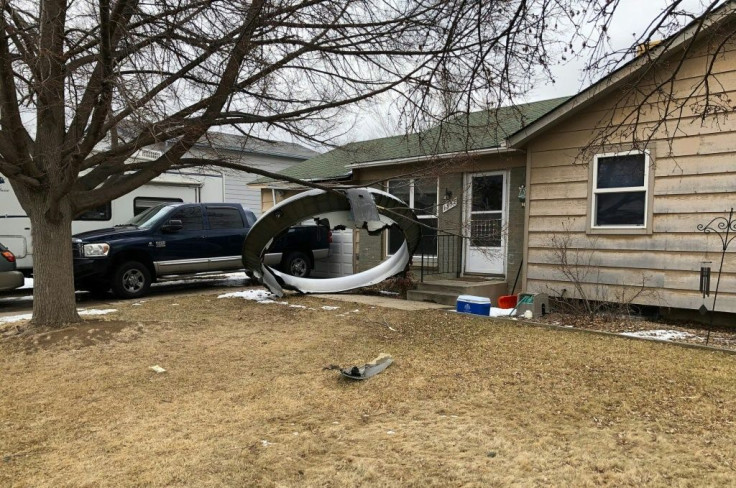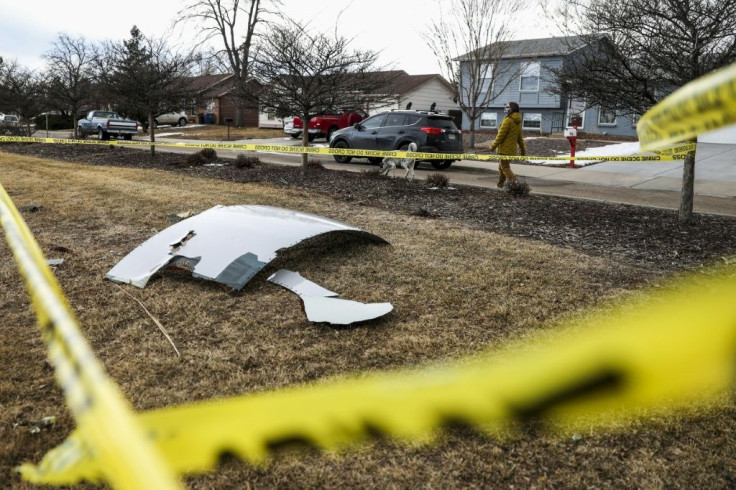Metal Fatigue Suspected In United Airlines Engine Scare
Metal fatigue has emerged as chief suspect in last week's spectacular engine failure on a United Airlines plane, which scattered debris over suburban Denver and led to dozens of Boeing 777 aircraft being grounded worldwide.
The incident on the Hawaii-bound flight -- which quickly returned to the airport after part of the engine caught fire and broke off -- prompted United and other airlines to ground planes with the same Pratt & Whitney engine.
While no one was injured in the Denver incident, the episode is the latest setback for Boeing, which only recently resumed deliveries of the long-grounded 737 MAX following two fatal crashes of that plane.
"A preliminary on-scene exam indicates damage consistent with metal fatigue," Robert Sumwalt, chair of the US National Transportation and Safety Board (NTSB), told a briefing Monday.
He said two fan blades fractured on the number 2 engine on the Boeing 777-200. One of them was later found on a soccer field, while the other remained lodged in the engine.

Boeing said all 128 of the 777s with Pratt & Whitney engines were grounded following Saturday's emergency landing of United flight 328.
Of the 128 planes, only 69 were in service while 59 were in storage.
Besides United, which removed 24 planes from service, affected airlines included Japanese carriers Japan Airlines and All Nippon, and South Korea's Asiana and Korean Air.
British Transport Secretary Grant Shapps announced a temporary ban on jets with Pratt & Whitney 4000-112 series engines from entering UK airspace.
Aviation experts said the incident especially raised questions about Pratt & Whitney and United over engine maintenance.

"It's nothing like the MAX," said Teal Group aviation analyst Richard Aboulafia. "After all these years of service it is unlikely to be a design issue with the engine, certainly it is something to do with maintenance."
The Denver incident followed a Japan Airlines 777 incident in December involving the same type of engine, as well as an engine problem in February 2018 on a United flight.
"There might be a common theme" among the three incidents "but until the investigation is complete, we don't know that," said Scott Hamilton of Leeham News, an aviation news site.

A video shot from inside the United aircraft -- which had 231 passengers and 10 crew on board -- showed the right engine ablaze and wobbling on the wing.
Residents in the Denver suburb of Broomfield found large pieces of debris from the plane scattered around their community.
The US Federal Aviation Administration (FAA) has ordered extra inspections after the incident.
FAA chief Steve Dickson said a preliminary safety data review pointed to a need for additional checks of the fan blades, unique to the model and only used on 777 planes.
FAA officials met Pratt & Whitney and Boeing representatives Sunday evening, he added.
Pratt & Whitney said it was cooperating with the NTSB probe and "will continue to work to ensure the safe operation of the fleet."
United said it was removing the aircraft from its schedule, "and will continue to work closely with regulators to determine any additional steps."
The engine failure is unwelcome news for Boeing, which also faces a fresh investigation in the Netherlands after a Boeing 747-400 cargo plane showered a small town with debris, injuring two people, on the same day as the Denver incident.
Boeing only recently resumed deliveries of the 737 MAX following a 20-month global grounding after two crashes killed 346 people.
The MAX began returning to commercial service in late 2020, with airline travel still depressed due to the coronavirus pandemic.
Michel Merluzeau, an expert at consultancy AIR, agreed the latest problem did not appear to result from poor plane design.
"It's not really a problem for Boeing," he said. "It's more an issue of maintenance -- how United or Pratt & Whitney is maintaining engines that have been in use for a while."
© Copyright AFP 2024. All rights reserved.





















